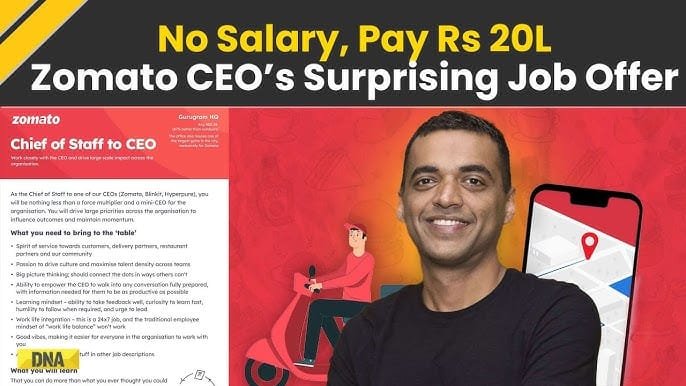A very surprising turn of events; a controversy that might lead the CEO of Zomato to have a legal tussle on his hands: for being accused of a rather suspicious job offer to the post of Chief of Staff with a “donation” of ₹20 lakh.
Although this is not yet verified, the news was delivered to The Philox from anonymous Zomato employees. This caused speculations upon the outcomes of this piece of information.
The Hateful Job Posting
Goyal, this November 2024 posted a job opening for a Chief of Staff in his company, Zomato. He provided no compensation over the course of one year and expected the candidate to donate ₹20 lakh to one of his charitable initiatives called Feeding India.
The conditions formed part of the unorthodox hiring process, which apparently was for people who believed in coming to learn more than to receive a pay-cheque.
Goyal defended the amount, saying ₹20 lakh was a sifting charge to filter in people who will understand and not those to whom only money matters:
The ad became viral; the whole world reacted strongly. Some hailed it as a bold move, while others condemned it for being exclusionary, arguing that only those with substantial financial resources could even consider applying.
The situation escalated when a number of anonymous Zomato employees contacted The Philox with claims that the Labour Department was investigating the matter. They suggested that the company’s actions could violate labor laws, although this claim has not been independently verified.
The Labour Department Notice: Fact or Fiction?
The anonymous email sent to The Philox said that the Labour Department had issued a notice to Zomato over the controversial hiring conditions.
Official sources have not confirmed this allegation, however. Employees, who did not want to be named, said that the problem was the company’s insistence on forcing a financial burden on potential employees in the form of the ₹20 lakh donation.
If that is the case, such an investigation would be centered on whether Zomato’s practices are in line with labor laws protecting employees from exploitative practice.
The act of requesting a job applicant to pay for an employment opportunity in a highly competitive industry may be considered against fair employment standards.
At present, neither Zomato nor the Labour Department has issued a formal statement confirming or denying these claims. However, the possibility of legal consequences looms large, and this uncertainty has further fueled the debate surrounding the job offer.
Clarification from Deepinder Goyal
Goyal, to douse the fire that had started to spread, issued a clarification on social media stating the intent behind the posting. He said the ₹20 lakh “donation” was never a financial requirement but a “filter” designed to attract applicants who were more interested in the learning opportunity than financial compensation.
The job was an intense learning experience and not a traditional paid position, he explained.
Despite his clarification, the job offer has widely been criticized for its apparent elitism, as many say such a condition would effectively bar big sections of the population from even thinking about applying to the position.
The controversy has ignited a much larger conversation on the ethics of recruitment practices, especially in a country like India where financial inequality remains a serious concern.
What’s Next for Zomato and Deepinder Goyal?
The situation remains fluid with no official confirmation regarding the involvement of the Labour Department. Zomato has not issued a statement regarding the claims from the anonymous employees, and it is not clear if the company will be served with formal charges.
The involvement of the Labour Department would have necessitated an investigation to find out if the company’s hiring practices violated labor laws on fair employment and worker rights.
The debate over Zomato’s Chief of Staff appointment underscores broader issues in corporate India concerning how companies structure their job opportunities and what metrics they use to choose recruits.
If the Labour Department acts, this may create a landmark judgment regarding the regulation of future such recruitment practices.
The public remains divided in waiting, however, with a significant proportion closely watching whether the courts will hold Zomato liable for its seemingly novel approach to recruitment.
While the news about a Labour Department notice regarding Zomato’s controversial Chief of Staff job offer remains unconfirmed, the situation has sparked a heated debate about corporate ethics and employment laws in India.
Anonymous Zomato employees have raised concerns about the legality of the hiring conditions, which have prompted a potential investigation. Now, as Zomato remains under increasing pressure, it would be interesting to see more on this particular issue when the Labour Department takes necessary action against it or otherwise.
Whatever might be the final decision, one thing seems sure: companies will surely change the designs and descriptions of job requirements in job postings going ahead.





Goyal is mad. He speaks mad, talks mad and does mad. Demanding money for employment is actually known as bribe taking even if camouflaged under a charity donation garb. A fellow who can charge a ‘Platform Fee’ on Customers whose only fault is bringing custom to these new start-up junkies even after being charged exorbitant delivery charges, inflated restaurant prices and ‘forcibly’ made to eke out ‘Tips’ from the public is insane. To say the least.
Platform liftoff charge : 20 lakh!!
😂😂😂